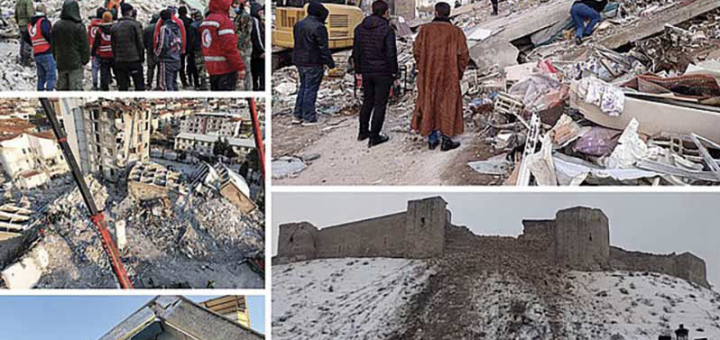Two Earthquakes astound Türkiye and Syria

Khai Choual, Staff Writer
The initial earthquake struck at a depth of 11 miles, which is approximately 17.9 km. The earthquake affected approximately 13 million Turkish civilians and the earthquake resulted in at least 120 aftershocks.
Turkish President Tayyip Erdogan declared a three-month state of emergency in the affected areas such as Nurdadi and Gaziantep in Gaziantep Province, and many provinces including Adana, Gaziantep, Hatay, Kahramanmaras, Malatya and Sanliurfa. Syrian cities such as Aleppo, Latakia, Hama and Idlib were affected with buildings damaged and collapsed.
Syria has already come across a humanitarian crisis with a 12-year conflict and refugee crisis which the earthquake has only caused further disaster adding to the already existing crisis in the region with over four million people relying on aid.
The earthquake in Türkiye and Syria has left hundreds of thousands of individuals homeless and has left many vulnerable to disease, exploitation and abuse. The harsh winter weather has caused damage to shelters and water infrastructure and has increased the risk of hypothermia and waterborne diseases. Children are also unable to return to school and buildings have been deemed unsafe.
The minister of International Development and minister responsible for the Pacific Economic Development Agency of Canada, Harjit S. Sajjan, announced Canada has provided 10 million in humanitarian assistance to help support medical services as well as providing shelter, food and essential items. Canada has also issued 50 million dollars in humanitarian assistance for Syria in 2023. Canada continues to monitor the situation in Türkiye and Syria and touch base with humanitarian partners to evaluate and respond to the needs.
Sajjan has stated that “Canadians are deeply saddened by the loss of life and terrible destruction caused by the earthquakes. Our initial response will go toward meeting the immediate, most urgent needs of those impacted by these devastating events. We continue to look at ways we can support those affected during these difficult times.”
Thirteen days after the earthquake in Türkiye and Syria, on Feb. 20, Southern Türkiye and Northern Syria regions were hit again by two new earthquakes with magnitudes of 6.4 and 5.8.
The death toll has reached more than 45,000 in both Syria and Türkiye, 4,500 deaths were reported in Northwest Syria. Access to aid finds another level of complications, as currently, only three crossing points are authorized for humanitarian aid between Türkiye and Syria. The death toll is anticipated to rise as bodies are being recovered from the rubble.
The latest quake was smaller in magnitude but reports declare more lives have been lost and many more people are injured. Many buildings have collapsed, health care services are disrupted, and more evacuations have taken place. The recent earthquakes caused severe delays in access to safe water.
A lot of humanitarian aid is now working and responding to the new quakes. Organizations such as the Red Cross, The International Federation of Red Cross and Red Crescent Societies (IFRC) and the Doctors Without Borders have aided Türkiye and Syria with teams consisting of volunteers and doctors, assisting the affected communities, including transporting, food and medical aid.
The World Health Organization (WHO) in response to the devastating earthquakes impacting Türkiye and Syria, has delivered 72 metric tons of trauma and emergency supplies, including treatments, to support the response efforts.


